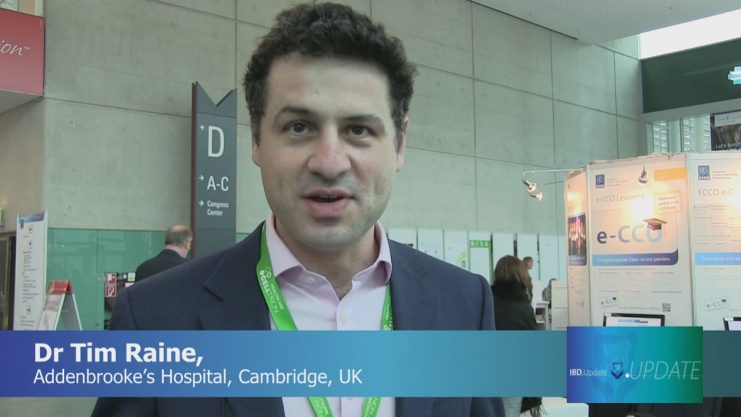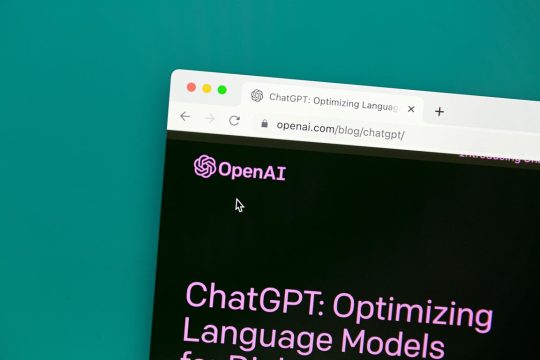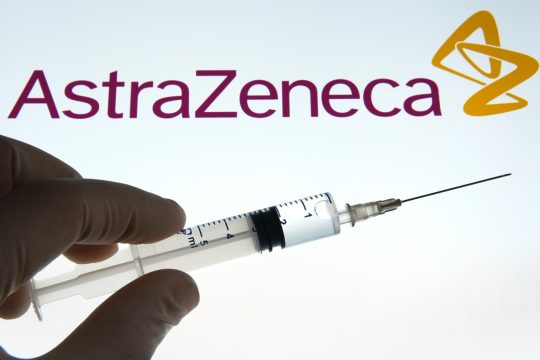Advertisment
ECCO 2018: Novel treatments in IBD

The current research and development pipeline of novel biologic therapies and small molecule drugs promises improved efficacy and safety in the treatment of IBD in the near future. However, the complexity and heterogeneity of the disease means it is unlikely that one single therapy will meet all clinical needs; instead rational use of combination therapy and multidisciplinary management will provide a bridge to fully personalised therapy…
Article by Maria Dalby. Interviews by Peter Mas Mollinedo.
Dr Tim Raine (Addenbrooke’s Hospital, Cambridge, UK) discusses updates on combining therapies in IBD.
The current research and development pipeline of novel biologic therapies and small molecule drugs promises improved efficacy and safety in the treatment of IBD in the near future. However, the complexity and heterogeneity of the disease means it is unlikely that one single therapy will meet all clinical needs; instead rational use of combination therapy and multidisciplinary management will provide a bridge to fully personalised therapy.
In a plenary talk on combination therapies, Dr Shomron Ben-Horin from Tel Aviv discussed how, far from being a novel concept, drug combinations are being used in daily IBD practice – often based on very little evidence as in the case of adding glucocorticosteroid therapy in patients with acute severe UC flares whilst on 5-ASA.1 A common rationale for combining anti-TNF therapy with immunomodulatory drugs is to reduce the risk of anti-drug antibodies;2 however, the latter may also have different immune effects and may indeed target other pathogenic mechanisms in IBD, such as microbiota dysbiosis.3, 4 Combination biologic therapy has been investigated in rheumatology, where multiple studies have compared anti-TNF monotherapy with combination therapy with other biologics including abatacept, rituximab, and anakinra, but so far failed to show a conclusive treatment benefit.5-7 In contrast, a single randomised controlled study in CD patients showed higher response rates with combination therapy with natalizumab and infliximab compared with infliximab alone, with a similar rate of adverse events.8 Anecdotal evidence from smaller case series and case reports in IBD patients suggests that efficacy can be improved without increasing adverse event rates by using combination therapy with vedolizumab and an anti-TNF or ustekinumab.9–15 A retrospective case-control study in which patients where co-exposed to vedolizumab and anti-TNF therapy showed no increase in adverse event rates or vedolizumab drug concentrations.16 An open-label single-arm study, EXPLORER, is currently underway to assess the efficacy of vedolizumab in combination with adalimumab and methotrexate versus vedolizumab alone in CD patients at high risk of complications. A further option for combination biologic therapy is offered by bi-specific antibodies which provide a means of combining monoclonal antibodies with different targets in a single molecule. Bi-specific antibodies are already in clinical development in haematological oncology and rheumatology and are showing promising efficacy.17,18
Dr Amy Lightner (Mayo Clinic, Rochester, USA), Professor Jean-Frederic Colombel (Icahn School of Medicine at Mount Sinai, NY, USA), Mr Kapil Sahnan (St Mark’s Hospital, London) and Dr Michael Scharl (University Hospital, Zurich) discuss the various studies using stem cell therapy for perianal fistulizing Crohn’s Disease.
A tandem talk by gastroenterologist Professor Silvio Danese from Milan and surgeon Dr Amy Lightner from Mayo Clinic in Rochester, Minnesota highlighted how stem cell therapy can facilitate multidisciplinary management of perianal CD. A large proportion of CD patients will at some point in the course of their disease develop perianal fistulas, an aggressive complication with frequent hospitalisations and a high degree of social and sexual disability due to pain and incontinence. Treatment recommendations issued by ECCO advocate a combination of anti-TNF therapy and surgical management for improved closure rates compared with anti-TNF alone,19 but Professor Danese stressed that there is still a huge unmet need for more effective treatment options. Using mesenchymal stem cells is one such option; unlike surgical methods such as seton placement, fistulotomy or diversion, stem cells offer a minimally invasive option with no risk of faecal incontinence. Stem cells are used to treat a number of other medical conditions including myocardial infarction and stroke; they exert immunomodulatory effects through upregulation of Treg cells and promote tissue repair and regeneration, and they migrate spontaneously to sites of inflammation. The first patient to receive stem cell treatment for a CD fistula was a young female patient with a recurrent rectovaginal fistula which healed within three months of treatment with stem cell therapy.20 Since then more than 300 patients have been treated in phase 1 and 2 trials, and a phase 3 randomised, double-blind trial in 212 CD patients with refractory complex perianal fistulas confirmed that stem cell therapy resulted in significantly higher remission rates at 24 weeks compared with placebo, with a favourable safety profile.21 The clinical benefit observed at 24 weeks was sustained at 52 weeks.22 Important research questions that remain to be answered include the optimal dosing, source and mode of delivery of stem cells and translation into systemic therapy for luminal CD.
Professor Laurent Peyrin-Biroulet (Nancy University Hospital, France), Dr Tim Raine (Addenbrooke’s Hospital, Cambridge, UK) and Professor Stefan Schreiber (Kiel, Germany) review updates at ECCO on small molecules for treating IBD.
Concluding the session, Professor Laurent Peyrin-Biroulet from France predicted the return of small molecules in IBD in the near future. Although the principal focus in IBD drug development in recent years has been on monoclonal antibodies following the revolutionary introduction of infliximab in the late 1990s, biologic treatments have many limitations including moderate efficacy, need for parenteral administration, immunogenicity, and high costs.23–26 This has led to renewed interest in small molecules that are suitable for oral administration, target intracellular structures and have short serum half-lives.27 The two main classes of small compounds in the IBD pipeline are JAK inhibitors and S1P modulators. Non-specific JAK inhibitor tofacitinib has been shown to induce and maintain remission in moderate to severe UC.28 Specific inhibition of JAK1 with filgotinib and upadacitinib may improve the risk-benefit ratio with respect to herpes zoster and other infections, and lipid profile alterations. Likewise in the S1P modulator class there is a trend towards more specific receptor targeting with ozanimod and etrasimod, to improve safety outcomes.29 Professor Peyrin-Biroulet pointed out that whilst newer small molecules may not necessarily be cheaper than biologic drugs, the benefits in terms of high persistence rates and no need for therapeutic drug monitoring could potentially meet important needs in the current IBD treatment paradigm.
References
- Ben-Horin S, Andrews JM, Katsanos KH, et al. Combination of corticosteroids and 5-aminosalicylates or corticosteroids alone for patients with moderate-severe active ulcerative colitis: A global survey of physicians’ practice. World J Gastroenterol 2017;23:2995-3002.
- Qiu Y, Mao R, Chen BL, et al. Effects of Combination Therapy With Immunomodulators on Trough Levels and Antibodies Against Tumor Necrosis Factor Antagonists in Patients With Inflammatory Bowel Disease: A Meta-analysis. Clin Gastroenterol Hepatol 2017;15:1359-1372 e6.
- Shin SJ, Collins MT. Thiopurine drugs azathioprine and 6-mercaptopurine inhibit Mycobacterium paratuberculosis growth in vitro. Antimicrob Agents Chemother 2008;52:418-26.
- Oancea I, Movva R, Das I, et al. Colonic microbiota can promote rapid local improvement of murine colitis by thioguanine independently of T lymphocytes and host metabolism. Gut 2017;66:59-69.
- Genovese MC, Cohen S, Moreland L, et al. Combination therapy with etanercept and anakinra in the treatment of patients with rheumatoid arthritis who have been treated unsuccessfully with methotrexate. Arthritis Rheum 2004;50:1412-9.
- Greenwald MW, Shergy WJ, Kaine JL, et al. Evaluation of the safety of rituximab in combination with a tumor necrosis factor inhibitor and methotrexate in patients with active rheumatoid arthritis: results from a randomized controlled trial. Arthritis Rheum 2011;63:622-32.
- WeinblattM, SchiffM, Goldman A, et al. Selective costimulation modulation using abatacept in patients with active rheumatoid arthritis while receiving etanercept: a randomised clinical trial. Ann Rheum Dis 2007;66:228-34.
- Sands BE, Kozarek R, Spainhour J, et al. Safety and tolerability of concurrent natalizumab treatment for patients with Crohn’s disease not in remission while receiving infliximab. Inflamm Bowel Dis 2007;13:2-11.
- Hirten R, Longman RS, Bosworth BP, et al. Vedolizumab and Infliximab Combination Therapy in the Treatment of Crohn’s Disease. Am J Gastroenterol 2015;110:1737-8.
- Yzet C, Dupas J-L, Fumery M. Ustekinumab and Anti-TNF Combination Therapy in Patients with Inflammatory Bowel Disease. The American Journal Of Gastroenterology 2016;111:748.
- Roblin X, Paul S, Ben Horin S. Co-treatment with golimumab and vedolizumab to treat severe UC and associated spondyloarthropathy. J Crohns Colitis 2017.
- Bethge J, Meffert S, Ellrichmann M, et al. Combination therapy with vedolizumab and etanercept in a patient with pouchitis and spondylarthritis. BMJ Open Gastroenterol 2017;4:e000127.
- Buer L, Høivik ML, Medhus AW, et al. P514 Combination treatment with vedolizumab and anti-TNF-α in inflammatory bowel disease: safety data. Journal of Crohn’s and Colitis 2017;11:S341-S342.
- Liu EY, Loomes DE. Ustekinumab and Vedolizumab Dual Biologic Therapy in the Treatment of Crohn’s Disease. Case Rep Med 2017;2017:5264216.
- Kuehbacher T, Abu Hashem R, Langel N, et al. P544 Combination therapy of vedolizumab and a TNF antagonist in IBD patients with severe chronic active, therapy refractory disease course. Journal of Crohn’s and Colitis 2017;11:S357-S357.
- Ben-Horin S, Ungar B, Kopylov U, et al. Safety, efficacy and pharmacokinetics of vedolizumab in patients with simultaneous exposure to an anti-tumour necrosis factor. Aliment Pharmacol Ther 2018.
- Viardot A, Goebeler ME, Hess G, et al. Phase 2 study of the bispecific T-cell engager (BiTE) antibody blinatumomab in relapsed/refractory diffuse large B-cell lymphoma. Blood 2016;127:1410-6.
- Fleischmann RM, Wagner F, Kivitz AJ, et al. Safety, Tolerability, and Pharmacodynamics of ABT-122, a Tumor Necrosis Factor- and Interleukin-17-Targeted Dual Variable Domain Immunoglobulin, in Patients With Rheumatoid Arthritis. Arthritis Rheumatol 2017;69:2283-2291.
- Regueiro M, Mardini H. Treatment of perianal fistulizing Crohn’s disease with infliximab alone or as an adjunct to exam under anesthesia with seton placement. Inflamm Bowel Dis 2003;9:98-103.
- Garcia-Olmo D, Garcia-Arranz M, Garcia LG, et al. Autologous stem cell transplantation for treatment of rectovaginal fistula in perianal Crohn’s disease: a new cell-based therapy. Int J Colorectal Dis 2003;18:451-4.
- Panes J, Garcia-Olmo D, Van Assche G, et al. Expanded allogeneic adipose-derived mesenchymal stem cells (Cx601) for complex perianal fistulas in Crohn’s disease: a phase 3 randomised, double-blind controlled trial. Lancet 2016;388:1281-90.
- Panes J, Garcia-Olmo D, Van Assche G, et al. Long-term Efficacy and Safety of Stem Cell Therapy (Cx601) for Complex Perianal Fistulas in Patients With Crohn’s Disease. Gastroenterology 2017.
- Nielsen OH, Ainsworth MA. Tumor necrosis factor inhibitors for inflammatory bowel disease. N Engl J Med 2013;369:754-62.
- Billioud V, Sandborn WJ, Peyrin-Biroulet L. Loss of response and need for adalimumab dose intensification in Crohn’s disease: a systematic review. Am J Gastroenterol 2011;106:674-84.
- Peyrin-Biroulet L, Deltenre P, de Suray N, et al. Efficacy and safety of tumor necrosis factor antagonists in Crohn’s disease: meta-analysis of placebo-controlled trials. Clin Gastroenterol Hepatol 2008;6:644-53.
- van der Valk ME, Mangen MJ, Leenders M, et al. Healthcare costs of inflammatory bowel disease have shifted from hospitalisation and surgery towards anti-TNFalpha therapy: results from the COIN study. Gut 2014;63:72-9.
- Olivera P, Danese S, Peyrin-Biroulet L. Next generation of small molecules in inflammatory bowel disease. Gut 2017;66:199-209.
- Sandborn WJ, Su C, Sands BE, et al. Tofacitinib as Induction and Maintenance Therapy for Ulcerative Colitis. N Engl J Med 2017;376:1723-1736.
- Peyrin-Biroulet L, Christopher R, Behan D, et al. Modulation of sphingosine-1-phosphate in inflammatory bowel disease. Autoimmun Rev 2017;16:495-503.





